高二英语语法知识点总结7(grammar)
重要高中英语语法总结
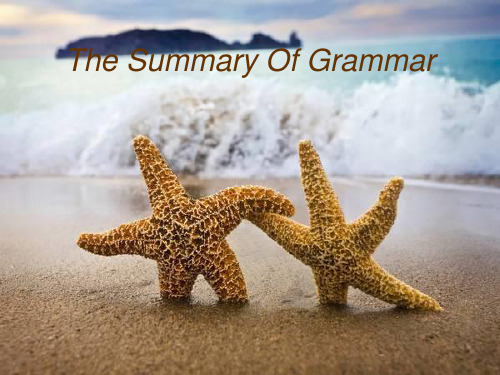
The attributive clause(定语从句)
定语从句做题步骤
1.判断句子是否为定语从句 2.若句子是定语从句,找到先行词,判断是人还是 物 3.分析句子是否缺少成分,然后选择关系代词或关 系副词 4.介词加which就相当于某些关系副词 5.What 一定不能用于定语从句中
That 在名词性从句中不充当任何句子成分,只起连接作用, 引导主语从句时常用it作形式主语;引导宾语从句时,常 被省略。 e.g. That she will refuse the offer seems unlikely.
只用whether不用if的场合
1.引导主语从句且置于句首时 e.g. Whether he will go there or not is not clear. 2.引导表语从句时 e.g. The problem is whether the TV play is worth watching. 3.引导同位语从句时 e.g. The news whether our team has won the match is unknown. 4.引导宾语从句,前置,同时又作介词的宾语从句时 e.g. We are interested in whether he will agree with us or not.
Noun clause(名词性从句)
名词性从句做题步骤
1.判断句子是否为名词性从句
2.若句子为名词性从句再判断是哪一种名词性从句 3.要分析该句是否缺少什么成分也就是说所选的连 接词除了引导名词性从句外是否要在该从句中充 当什么成分 4.要特别注意同位语从句(which不能引导同位语从 句)
名词性从句的种类
英语语法汇总Grammar

英语语法汇总Grammar营口高中韩祥宇目录contents一.时态二.冠词三.代词四.介词和介词短语五.形容词和副词六情态动词七.非谓语动词八.简单句和并列句九.倒装十.情景交际十一.定语从句十二.名词性从句十三.状语从句§一时态一进行体①现在进行时 1.look! what is he doing 表示说话时正在发生的动作2.目前这段时间的持续(不强调起止) eg:⑴He is writing a novel these day⑵I’m just helping until the new secretary(秘书)comes3.终止性动词(非延续性动词)的进行体表将来,有计划性。
4.“越来越”表渐进性 eg:It’s getting cooler and cooler5.eg:always/forever表示说话人的赞扬或抱怨/constantly(经常的)②将来进行时 1.形式will/shall be doing2.表示未来将于某一段某一点3.表推测(客观存在)无计划性表可能 eg:I shall be meeting Alice.③完成进行时 1.形式have/has been doing2.强调持续性,强调中间无间断3.延续性 eg:I have been writing a report which will finished tomorrow.4.非延续性动词用于完成进行时表反复性 eg:Since summer this year he have been going to the night school(自从去年夏天,他一直去夜校)二完成体①现在完成时 1.形式have/has done2.有起点(过去)有终点(现在)不强调过去什么时候发生,只强调现在什么时候完成。
3.动作发生在过去持续到现在4.动作没持续到现在但影响持续到现在 eg:I got caught in the rain just now any coat has been damaged5.曾经有过的经历6.说话所处的时间段内反复发生的动作 eg:Tom’s car has been broken into five’s this month.7.句型:It is(现在时)the first time(that)I have seen(现在完成时)the film.seen(现在完成时) ever since.eg2: When he came to,he wondered how long he had lain(躺)on the ground.②将来完成时 1.形式will/shall have done2.by+将来时间状语 eg:By the end of this year,I will have finished this job.3.主将从现eg:{By(将来时间点) the time I arrived(现在时)}(时间状语从句),Tom will have left.三一般体①一般现在时 1.表示性质,状态,属性,特征2.表示频度,经常性※反例:I didn’t ask for the name list how has it landed on my dask?3.客观事实(书评、影评、真理、文学评论)4.固定时间发生的事用现在时替代将来时。
英语语法知识点英文归纳总结
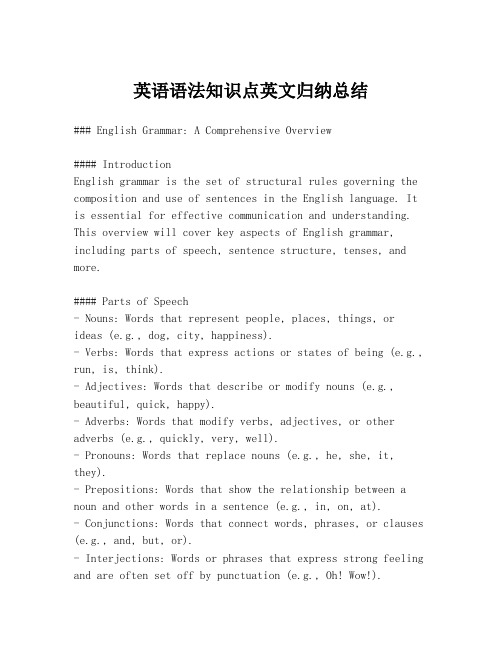
英语语法知识点英文归纳总结### English Grammar: A Comprehensive Overview#### IntroductionEnglish grammar is the set of structural rules governing the composition and use of sentences in the English language. It is essential for effective communication and understanding. This overview will cover key aspects of English grammar, including parts of speech, sentence structure, tenses, and more.#### Parts of Speech- Nouns: Words that represent people, places, things, or ideas (e.g., dog, city, happiness).- Verbs: Words that express actions or states of being (e.g., run, is, think).- Adjectives: Words that describe or modify nouns (e.g., beautiful, quick, happy).- Adverbs: Words that modify verbs, adjectives, or other adverbs (e.g., quickly, very, well).- Pronouns: Words that replace nouns (e.g., he, she, it, they).- Prepositions: Words that show the relationship between a noun and other words in a sentence (e.g., in, on, at).- Conjunctions: Words that connect words, phrases, or clauses (e.g., and, but, or).- Interjections: Words or phrases that express strong feeling and are often set off by punctuation (e.g., Oh! Wow!).#### Sentence Structure- Subject: The person, place, thing, or idea that performs the action or is being described.- Predicate: The part of the sentence that contains the verb and describes what the subject is doing or what is happening to it.- Object: The noun or pronoun that receives the action of the verb.#### Tenses- Present Simple: Used for habitual actions or general truths (e.g., She walks to school every day).- Past Simple: Used to describe completed actions in the past (e.g., He visited his grandparents last week).- Future Simple: Used to talk about actions that will happen in the future (e.g., They will travel to Japan next year).- Present Continuous: Describes actions happening at the moment of speaking or around now (e.g., We are having dinner now).- Past Continuous: Describes an action that was happening at a specific time in the past (e.g., They were watching a movie when the power went out).- Future Continuous: Predicts an action that will be happening at a certain time in the future (e.g., She will be studying at that time tomorrow).#### Verb Forms- Infinitive: The basic form of a verb, often preceded by "to" (e.g., to run, to eat).- Gerund: A verb form that ends in -ing and functions as anoun (e.g., Running is good exercise).- Participle: A verb form used in perfect tenses and as adjectives (e.g., The broken glass cut my foot; The glass was broken).#### Clauses- Independent Clause: A clause that can stand alone as a complete thought (e.g., The cat slept on the couch).- Dependent Clause: A clause that cannot stand alone and needs an independent clause to complete its meaning (e.g., Because it was raining, the game was canceled).#### Punctuation- Commas: Used to separate items in a list, clauses, or to indicate a pause (e.g., I bought apples, bananas, and oranges).- Periods: Used to end a complete sentence (e.g., She went to the store).- Semicolons: Used to connect closely related independent clauses (e.g., I have a big test tomorrow; I didn't study). - Colons: Used to introduce a list or a quotation (e.g., There are three colors: red, blue, and green).- Quotation Marks: Used to indicate direct speech or a quotation (e.g., She said, "I will be late").#### ConclusionUnderstanding and applying these grammar rules is fundamental to mastering the English language. Practice and exposure to various forms of written and spoken English will help in becoming proficient in using these rules correctly. Remember,grammar is a tool for clear and effective communication, so it's worth the effort to learn and use it well.。
英语语法Grammar

1 (see 、hear 、notice 、find 、feel 、listen to 、look at (感官动词)+do eg:I like watching monkeys jump2 (比较级and 比较级)表示越来越怎么样3 a piece of cake =easy 小菜一碟(容易)4 agree with sb 赞成某人5 all kinds of 各种各样a kind of 一样6 all over the world = the whole world 整个世界7 along with同……一道,伴随……eg : the students planted trees along with their teachers 学生同老师们一起种树8 As soon as 一怎么样就怎么样9 as you can see 你是知道的10 ask for ……求助向…要…(直接接想要的东西)eg : ask you for my book11 ask sb for sth 向某人什么12 ask sb to do sth 询问某人某事ask sb not to do 叫某人不要做某事13 at the age of 在……岁时eg:I am sixteen I am at the age of sixteen14 at the beginning of …………的起初;……的开始15 at the end of +地点/+时间最后;尽头;末尾eg : At the end of the day16 at this time of year 在每年的这个时候17 be /feel confident of sth /that clause +从句感觉/对什么有信心,自信eg : I am / feel confident of my spoken English I feel that I can pass the test18 be + doing 表:1 现在进行时2 将来时19 be able to (+ v 原) = can (+ v 原)能够……eg : She is able to sing She can sing20 be able to do sth 能够干什么eg :she is able to sing21 be afraid to do (of sth 恐惧,害怕……eg : I'm afraed to go out at night I'm afraid of dog22 be allowed to do 被允许做什么eg: I'm allowed to watch TV 我被允许看电视I should be allowed to watch TV 我应该被允许看电视23 be angry with sb 生某人的气eg : Don't be angry with me24 be angry with(at) sb for doing sth 为什么而生某人的气25 be as…原级…as 和什么一样eg : She is as tall as me 她和我一样高26 be ashamed to 不好意思…27 be away from 远离28 be away from 从……离开29 be bad for 对什么有害eg : Reading books in the sun is bad for your eyes 在太阳下看书对你的眼睛不好30 be born 出生于情感型使动词表示客观事物使人产生情感上的变化,可以分为下列概念:(1)惊讶(surprise);(2)高兴(delight);(3)恼怒(irritation);(4)烦扰(trouble);(5)兴趣(interest);(6)激动(excitement);(7)迷惑(bewilderment);(8)坚信(conviction);(9)恐吓(fright);(10)厌倦(tiredness)和(ll)愤怒(anger)。
英语语法知识点总结

名词短语(noun phrase)NP isA core核心的,关键的element元素of a sentence 构造“左二右六”定语规律汉语中心词head在后Head-last languageEnglishHead-first languageChapter one名词名词的分类:专有名词:proper noun普通名词:common noun1 人名及头衔zeke/’zeki/coral色彩斑斓的石头AreslociThe Queen of england2 著作名称War and peaceThe merchant商人of venice威尼斯Pride and prejudice3 月份JanuaryFebruaryMarchaprilMayjuneJulyAugustseptemberOctoberNovemberDecember公历阳历the solar太阳的calendar日历农历阴历the lunar 月亮的calendarMondayTuesdaywednesdayThursdayFridaySaturdaySunday5 节日The spring festival春节The midautumn festivalSpringSummerAutumnWinterCrismersChristmas结婚纪念日marry marriedwedding anniversary6 地理名称The yellow riverYangtze river长江经济带the yangtze economic belt EconomySafety belt喜马拉雅山The himalayas中华人民共和国The people’s republic of chinaCPC 中国共产党the communist party of china 可数与不可数1 不可分割Air coffee oil paper milk beef chicken fish2 组成部分太小不易数清Corn sand grass hair3 表示总称Clothing food furniture一件家具a piece of furnitureLuggageMakeupHomeworkHouseworkJewelryMoney cash4 抽象名词Advice fun life patience5 学科subjectsMath chinese english physics chemistry biology grammar There is _ in my soup!These boys need to have their _ cut.I don’t like wearing_A long hair b a long hair c long hairs单数与负数Singular and pluralSg. And pl.A single dogBachelorOne half dayOne dayOne and a half days只用作单数的名词不可数名词与专有名词只用作复数的名词1 “二合一”复数名词工具和仪器GlassesSpectaclesScalesForceps 钳子,镊子TongsScissors2 服装JeansTrousersTrunks 男士泳裤PajamasA pair of3 单数的形式,复数的意思People personPeople 民族The chinese people have achieved a great success. Cattle 牛群PolicePoultry 家禽Livestock 牲畜The +adj. 表示一类The rich 有钱人复数专有名词五大湖the great lakes规则的复数名词Desk desksClass classesS x ch sh +esY iOTomato heroF fe vesLeaf leavesThief thieves不规则的复数名词公式formula formulas/formulae索引index indexes/indicesAnalysis anlyses分析Basis bases基础数据datum data细菌bacterium bacteria复合名词变复数Man doctorMen doctors岳母mother-in-lawMothers-in-law单复同形Sheep 绵羊Deer 鹿区分词义Arm 手臂Arms 武器=weapon,军事The arms race军备竞赛Custom 风俗Customs 海关交关税pay customs dutyDamage 损坏,损失Damages 赔偿金Letter 信Letters 文学Minute 分钟Minutes 会议记录Spirit 精神Spirits 烈酒Premise 前提Premises 营业场所Business premisesSecurity 安全Securities 证券Securities market 证券市场Line 行Lines 台词名词的所有格My brother’sChildren’sFriends’并列名词John and his wife’s bank savings共有的John’s and his wife’s bank savings各自的主谓The visitor’s departure=the visitor departed动宾The children’s education=somebody educated the children同位Bhutto’s lossThe loss of bhutto限定词冠词的分类不定冠词:a an开头发音是否为元音_an SOS sign_an L letter is in the word “letter”定冠词:the开头发音是否为元音The cakeThe MVP most valuable playerAOE area of effectKDA kill death assist零冠词特指与泛指The lion is a dangerous animal.泛指The lion escaped from the zoo.特指四种常见的泛指表达1 不可数名词不加冠词表示泛指Life is hard sometimes.The writer is writing a book about the life of blacks in America.特指2 复数名词不加冠词表示泛指Tigers are becoming almost extinct.Tigers are dangerous animals.The tigers are sleeping in the cage.The chineseThe poor3 单数名词与定冠词the 连用可以表示泛指The tiger is becoming almost extinct.Tigers are becoming almost extinct.4 单数名词与不定冠词连用表示泛指A tiger is a dangerous animal.定冠词the1 情景/文化特指Situational / cultural referenceLiu xiang ,the famous hurdler2一般常识北极the north poleThe sun the earth the moon3 具体知识Have you visited the castle?城堡4 即时情景用法immediate situationThe roses are very beautiful.上下文共指textual co-reference前指anaphoric reference后指cataphoric referenceI had a banana and an apple.i ate the banana and gave the apple to clint.结构特指structural referenceThe brick house on the corner is mine.不定冠词I read a great book last week.I want to read a book.和one的关系A mile or twoOne or two milesOne night there was a terrible storm.一天晚上,刮起了特大的风暴At table 就餐At the table 在桌子旁边Go to bed 上床睡觉Go to the bed 到床边In hospital住院In the hospital在医院里零冠词1关于职业、身份或头衔They appointed him head librarian.He was elected president in 1879.2特殊名称Nature泛指自然界Society 泛指社会Man 泛指整个人类Man can conquer nature.人定胜天星期She left on MondayOn the Monday before christmasOn SundaysIn springAt dawn at sunsetAt noon at nightBy busOn footBy teleponePhone telephone cell pone 老式手机智能手机phone iphoneSmart phone平行结构Face to faceArm in armHand in handDay by day数量限定词与个体限定词I was found on the ground by the fountain at Valder fields and was almost dry我躺在瓦尔德的田野中,靠在泉水旁被太阳晒得昏昏沉沉lying in the sun after I had tried终于挣扎不动了lying in the sun by the side任凭烈日洗礼吧we had agreed that the council would end at three hours over time 我们一致赞同议会将在三个小时后结束Shoelaces were tied at the traffic lights在红绿灯前我系了系鞋带I was running late, i could apply虽然还是迟到了,可我想我还能行的For another one i guess换份工作吧,试试吧If department stores are best如果在百货商店最好不过了they said there would be delays无非是拖着几天工资而已Only temporary pay我也知道,这不是长久之计For another one I guess换份工作吧,试试吧If department stores are best如果在百货商店最好不过了They said there would be delays无非是拖着几天工资而已Only temporary pay我也知道,这不是长久之计She was found on the ground in a gown made at Valder fields and was sound asleep她躺在瓦尔德的田野中,穿着精美的定制礼服安稳的睡着了safe and sound平安Stairs above the door to the man who cried门外台阶上哭着的那个男人When he said that he loved his life说他曾真的很热爱生活We had agreed that the council should take his keys to the bedroom door我们一致赞成应该拿走他房门的钥匙Incase let he slept and was found in two days in Valder fields with a mountain view既然他已在瓦尔德如画的山色中睡了两天,那就让他继续沉睡数量限定词与个体限定词A few ,few 只能接复数名词A little ,little 只能接不可数名词A few , a little 肯定Few ,little 否定Only a fewVery few ,very littleYou can catch any bus. They all go to the railway station.某一个Some good restaurant某一家餐馆Some 1,500 passengers大约1500名乘客个体限定词Every boy has a gift.Each boy has a gift.Each :指两个或两个以上Every:三个或三个以上Each 不与数词连用Every two daysEvery four yearsAnother dayAnother three days 另外三天=three other daysCan you give me some other reference books?参考书prefereither of the answers is not correct.=neither of the answers is correct.表示二表示三Both allNeither noneThe other anotherEach everyOnly _ dollars have been borrowed from the manager.A a fewB fewC someD littleAll most some any ofMuch a little little of限定词的位置关系我工资的一半:Half my salary前位限定词中位限定词后位限定词All my manyBoth the last twoA kind womanShe spent _ on clothes.A her all earningsB her all earningC all her earningsD all her earningI have classes_ day,Mondays, Wednesdays and Fridays.A each otherB every otherC one anotherD all other形容词前置修饰名词限定词形容词名词An interesting bookA beautiful smileMy best friend多个形容词修饰名词时的词序排列Opinion adjective+descriptive adjectiveA beautiful white table描绘形容词的顺序Size shape age color origin material SSACOM大小形状新旧颜色国籍出处材质李白是中国古代一位伟大的诗人Li bai is a great ancient chinese poet.房间里有一张很大的黑色木桌There is a big black wooden table in the room一个水晶crystal饮水drinking玻璃杯a crystal drinking glassUNESCO 联合国教科文组织The united nations educational ,scientific and cultural organization The security council 安理会The international monetary fund (IMF)Money国际货币基金组织The international olympic committee国际奥委会Three pros, one con and one abstention三票赞成,一票反对,一票弃权The pacific rim环太平洋地区Peace-keeping operations维和行动Permanent ceasefire永久停火Unilateral action单边行动Bilateral relations双边关系Humanitarian aid人道主义援助Geopolitical 地缘政治的Prime minister首相Whitewash war crimes粉饰战争罪行Claim compensation索赔Deny the nanjing massacre否认南京大屠杀Zero-sum game 零和游戏0 +1 -1Military intervention军事干预Central intelligence agency (CIA)中央情报局Federal bureau of investigation (FBI)联邦调查局1 A _dress that the movie star woreA silk,long,gorgeous,redB red,long,silk,gorgeousC gorgeous,long,red,silkD long,gorgeous,silk,red2 A pair of _ boots that were kept in the stableA smart,brown,leather,ridingB brown,smart,riding,leatherC leather,brown,smart,ridingD riding,smart,brown,leather3 A _scarf knitted by my grandmotherA stripy,warm,winter,woolenB winter,woolen,warm,stripyC woolen,winter,stripy,warmD warm,stripy,woolen,winter形容词的比较级和最高级的构成形式单音节词-er -estBright brighter brightest-e r stBrave braver bravestY -ier -iestShy shier shiestFat fatter fattest双音节Early earlier earliestSlowly more mostInteresting more mostSpecialGood/well better bestBad /ill worse worstFar farther/further estOld older/elder estLittle less leastMany /much more mostLate later/latter latest/lastUp upper uppermost/upmost不具有表绝对Absolute 完全的,绝对的Alone 单独的,独一无二的Dead 死的Empty 空的(the )比较级+thanMore and more句型不能用于单音节词More and more fat修饰比较级的词A bit ,a little bit, a lotAre you feeling any better?否定+比较表示最高级How have you been ?It couldn’t be worse.你怎么样?不能再糟了、糟透了The most interesting bookThe story is most interesting.很,非常-ing -edInterested interesting一个无趣的人a boring man一个烦闷的人a bored man动词实义动词notional verb与助动词auxiliary(情态动词)modal verb 助动词Do : does,didBe : am ,is ,are,was,were,been,beingHave: has,had,havingBe ,do ,haveI am a student.I am studying grammer.Can,could ,must,Can /couldMay/mightWill/wouldShall/shouldMust/had betterBe able toBe going toOught to ,be supposed toHave to, have got toNeed ,dare陈述句的否定He is a teacher.He is not a teacher.I like englishI don’t like englishI am am notWe/you/they areAre not aren’tIs not isn’tN’tWill notWon’tShall not shan’tShould notMay not一般疑问句He is a teacher.Is he a teacher?Yes,he is.no ,he isn’tHe likes english.Does he like english?Yes,he does.no,he doesn’t特殊疑问句不与名词连用He can sing in english.Who can sing in english?要与名词连用This is his book.Whose book is this?HowHow do you go to work?How old are you?How oftenHow many句型时态四时四态Tense时1 现在时present2 过去时past3 将来时future4 过去将来时past futureAspect态1 简单体simple2 进行体continuous3 完成体perfect4 完成进行体perfect continuous一般时态1 表示普遍的事实或者真理expressing a general truth Knowledge is power.2 表示重复活动expressing a regularly occurring eventHe often goes to the gym.I like rice for dinner.He is always late.SeldomHe doesn’t seldom come late.The history lectures sometimes aren’t interesting.3Here comes your wife.4 条件状语if ,unless与时间状语when,as soon as ,before,after中Please let me know when he comes back.他回来时请告诉我If you will give me a hand with these books,I’ll appreciate it.如果你愿意帮我拿这些书,我将非常感激表示短暂性的动词go ,come,leave,start,moveThe train starts at 2 o’clock.火车两点钟开I will reward the person who finds my lost kitten.小猫我将酬谢找到我丢失的猫的人5一般现在时表过去表示死者的理论,著作等Francis bacon says,””引用书籍The newspaper reads,””6 一般现在时指代现在完成时动词hear,find,see,learn,tell,readI am(=have been)informed that you have been there.有人告诉我,你去过那里Vice president副总统副的associatedNational security councilSenate 参议院The majority leader多数党领袖Secretary of state 国务卿Secretary of defense/treasury/commerceAttorney general司法部部长Supreme court最高法院The republic party共和党The democratic party民主党Military provocation 军事挑衅Armament race 军备竞赛一般过去时态the past simple tense1 过去发生的短暂动作或状态I saw him in the library yesterday morning.我昨天早上在图书馆看到他了2 过去发生的重复或延续活动I slept for eight hours last night.我昨晚睡了八个小时1 我不知道I don’t know ; I didn’t know2 我忘记了I forget ; I forgotI forget the meaning of the word.I forgot to bring your earphone back.3 我以为I think ; I thought4 语境It is nice to meet you.It was nice to meet you.5 礼貌表达委婉推测I wondered if you could help me.我想知道你能否帮我一般将来时态——预测、计划和意愿Will表将来-预测Wil we live on Mars?我们能生活在火星上吗?Be going to 表将来-预测It’s not going to snow again tomorrow,is it? It was supposed to be warm all week.明天不该再下雪了吧?天气预报本来还说这一周都会很暖和的。
高二上学期英语重点知识点

高二上学期英语重点知识点一、词法(Lexical)1. 词汇量的扩充:英语单词的记忆与应用;2. 词性与词义的辨析:常见单词的不同词性与词义辨析;3. 词根、前缀和后缀的运用:单词构词规律的运用。
二、语法(Grammar)1. 时态与语态:各时态和语态的基本用法及变换;2. 从句与连接词:主从复合句的构成与连接词的使用;3. 并列句与连接词:并列句的构成与连接词的使用;4. 倒装句与强调句:倒装句和强调句的基本用法;5. 虚拟语气:虚拟条件句和虚拟结果句的构成与用法;6. 名词性从句:宾语从句、主语从句和表语从句的用法。
三、阅读(Reading)1. 词汇理解:通过上下文推断词义;2. 主旨理解:确定文章的中心思想;3. 细节理解:找出文章的关键信息;4. 推理判断:根据文章的信息进行推理判断;5. 内容补全:根据上下文补全文章的缺失部分。
四、写作(Writing)1. 作文的结构:引言、承题、论点、论证、结论的结构要素;2. 功能性写作:书信、申请信、简历等不同场景下的写作;3. 议论文写作:表达观点、论证论点、给出建议;4. 图表作文:描述和分析图表中的数据和趋势。
五、听力(Listening)1. 听取关键信息:听取对话和提问中的关键信息;2. 听取细节信息:听取对话和短文中的具体细节;3. 听取观点和态度:听取对话和短文中的观点和态度。
六、口语(Speaking)1. 日常交际用语:问候、道歉、感谢等日常交际用语;2. 话题表达与说理:能够表达自己的观点和理由;3. 情景对话:根据情景进行角色扮演对话。
该学期英语的重点知识点主要包括词法、语法、阅读、写作、听力和口语等方面。
其中,词法主要涉及扩充词汇量、辨析词性和词义、运用词根、前缀和后缀等内容;语法包括时态与语态、从句与连接词、并列句与连接词、倒装句与强调句、虚拟语气和名词性从句的应用;阅读方面需要注意词汇理解、主旨理解、细节理解、推理判断和内容补全等技巧;写作要掌握作文的结构、功能性写作、议论文写作和图表作文等技能;听力方面需要听取关键信息、细节信息以及观点和态度;口语则要学习日常交际用语、话题表达与说理以及情景对话。
英语语法第一课
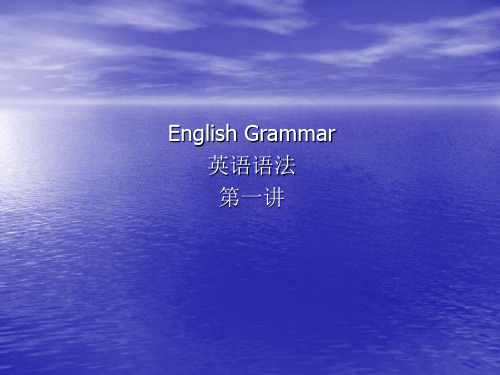
语的动作和状态的。
• 3.表语(predicative)它是放在连系动词之
后表示主语的身份或特征的。表语也就是 主语补语。补语(complement)分为主语补 语和宾语补语。
• 4.宾语(object)它是表示及物动词动作的
对象的。
• 5.定语(attribute)它是限定或修饰名词或
English Grammar 英语语法 第一讲
1.语法是什么? (What is grammar? )
• 语法是语言的组织规律, 它赋予语言以结构
系统。(the entire system of a language, including its syntax, morphology, semantics, and phonology)
• 7.冠词(article, 缩写为art.) 说明名词所指的
人或物的词。An article is a name for the (definite article) and a, an (indefinite
article).
• 8.介词(preposition,缩写为prep.) 表示名词
• 4.他是我的顶头上司。 • He is above me. • 5.微积分对我来说太难了。 • Calculus was always beyond me. • 6.你打这个电话就能找到我。 • You can reach me at this phone number.
4. How does that song go?
• 具体地讲, 主要有下列六种句子成分。
• 1. 主语(subject)它是句子所要说明的人
或事物, 是一句的主体。The subject is the part of the sentence that names whom or
英语语法知识大全grammar

一. Tense (1. 时间状语; 2. 动词)1.一般现在时:1) 和时间无关;The sun rise s in the east and set s in the west.2) 在时间和条件状语中,用一般现在时代替将来时。
“主将从现”I’ll ring you as soon as/if he come s back.2.现在进行时:1) 表示厌恶、感激等强烈的感情。
She is always cooking some delicious food for us.He is always finding fault with his employees.3.一般过去时1) 和表示过去的时间状语连用, 如: yesterday, last week, in 1993, at that time, before---, a few days ago, when…等He smok ed forty cigarettes a day at that time.2) used to do, be used to doing, be used to do sthHe used to work fourteen hours a day.I am used to getting up early in the morning.The pen is used to draw the picture.4.现在完成时(Present Perfect )现在完成时的时间状语1)不确定的过去时间状语:(already, yet), before, recently, lately2)频率时间状语:often, sometimes, never, ever, once, twice, three times3)包括现在时间在内时间状语:now, just, today, this morning(week, month),until(up to) now, so far, in the past(last) two days(weeks, months),all day, for three years, since 19905.过去完成时(Past Perfect)1) 过去的过去They fulfill ed the plan earlier than they had expected.2) 过去完成时常和“by the end (time) of + 过去时间”连用3) hardly/scarcely ... when... 和no sooner ....than常用过去完成时=as soon asI had hardly reached the school when the bell rang.No sooner had I reached the school than the bell rang.6. 将来完成时将来完成时常和“by the end(time) of + 将来时间”连用。
英语语法知识知识点总结

英语语法知识知识点总结1. Parts of Speech- Nouns: Nouns are words that represent people, places, things, or ideas. They can be common or proper, singular or plural, and concrete or abstract.- Pronouns: Pronouns are words that are used to replace nouns. They include personal pronouns, demonstrative pronouns, indefinite pronouns, and relative pronouns.- Verbs: Verbs express actions, events, or states of being. They can be transitive or intransitive, finite or non-finite, and regular or irregular.- Adjectives: Adjectives are words that modify nouns and pronouns by describing or giving more information about them. They can be comparative or superlative.- Adverbs: Adverbs modify verbs, adjectives, and other adverbs by providing more information about when, where, why, or how something happens.- Conjunctions: Conjunctions are words that connect words, phrases, and clauses. They include coordinating conjunctions, subordinating conjunctions, and correlative conjunctions.- Prepositions: Prepositions are words that show the relationship between a noun or pronoun and another word in the sentence.- Interjections: Interjections are words that express strong emotions or sudden feelings and are often followed by an exclamation point.2. Sentence Structure- Subject and Predicate: A sentence consists of a subject and a predicate. The subject is the person, place, thing, or idea that the sentence is about, while the predicate is the part of the sentence that contains the verb and provides information about the subject.- Simple Sentences: A simple sentence consists of a single independent clause with a subject and a predicate and expresses a complete thought.- Compound Sentences: A compound sentence consists of two or more independent clauses joined by a coordinating conjunction or a semicolon.- Complex Sentences: A complex sentence consists of an independent clause and one or more dependent clauses connected by a subordinating conjunction.- Types of Clauses: Clauses can be independent or dependent. An independent clause can stand alone as a complete sentence, while a dependent clause relies on an independent clause to form a complete thought.3. Verb Tenses- Present Tense: The present tense is used to describe actions or events that are currently happening, facts, habits, and general truths.- Past Tense: The past tense is used to describe actions or events that have already happened or to refer to a previous time.- Future Tense: The future tense is used to describe actions or events that will happen at a later time.- Continuous Tenses: Continuous tenses are used to describe actions or events that are ongoing or in progress at a specific time.- Perfect Tenses: Perfect tenses are used to describe actions or events that were completed before a specific time or to show a connection between a past event and the present.- Conditional Tenses: Conditional tenses are used to talk about hypothetical situations or events and their possible consequences.4. Articles and Determiners- Articles: Articles are words that come before a noun and indicate whether the noun is specific or nonspecific. English has two articles: "the" (definite article) and "a" or "an" (indefinite articles).- Demonstratives: Demonstratives are words that indicate or point to specific people or things. They include "this," "that," "these," and "those."- Possessives: Possessives are words that show ownership or relationship between two nouns. They include "my," "your," "his," "her," "its," "our," and "their."- Quantifiers: Quantifiers are words used to express quantity or show how many or how much of something there is. They include "some," "many," "few," "several," "enough," "much," and "little."5. Phrasal Verbs and Idioms- Phrasal Verbs: Phrasal verbs are combinations of a verb and one or more particles (prepositions or adverbs) that function as a unit and have a different meaning from the original verb. They are common in spoken and informal English.- Idioms: Idioms are expressions or phrases with a figurative or non-literal meaning that cannot be understood from the individual words. They are often culturally specific and may not make sense when translated directly into another language.6. Direct and Indirect Speech- Direct Speech: Direct speech is the exact words spoken by a person and is enclosed in quotation marks.- Indirect Speech: Indirect speech is a way of reporting what someone else said without using their exact words. It is often introduced with reporting verbs such as "say," "tell," "ask," etc., and the tense, pronouns, and time expressions may change in indirect speech.7. Modifiers and Parallelism- Adjective and Adverb Modifiers: Adjective and adverb modifiers are used to provide more information about nouns, pronouns, verbs, adjectives, or other adverbs.- Parallelism: Parallelism is the use of the same grammatical structure in a pair or series of related words, phrases, or clauses to create symmetry and balance in a sentence.8. Relative Clauses and Appositives- Relative Clauses: Relative clauses are dependent clauses that provide additional information about a noun in the main clause. They are introduced by relative pronouns or adverbs such as "who," "whom," "whose," "which," and "that."- Appositives: Appositives are noun phrases that rename or explain another noun or pronoun and are set off by commas. They are often used to provide additional information or clarify a concept in a sentence.9. Passive Voice- Passive Voice: The passive voice is a grammatical construction in which the subject of a sentence is acted upon by the verb. It is formed using the verb "to be" plus the past participle of the main verb. Passive voice is often used when the focus is on the receiver of the action rather than the doer.10. Conditional Sentences- Conditional Sentences: Conditional sentences are used to talk about a hypothetical situation or event and its possible consequences. They consist of an "if" clause (the condition) and a main clause (the result).- Types of Conditional Sentences: Conditional sentences can be categorized into four types based on their likelihood or probability of occurrence: zero conditionals, first conditionals, second conditionals, and third conditionals.In conclusion, mastering English grammar knowledge points is essential for understanding and using the language effectively. By familiarizing oneself with the parts of speech, sentence structure, verb tenses, articles and determiners, phrasal verbs and idioms, direct and indirect speech, modifiers and parallelism, relative clauses and appositives, passive voice, and conditional sentences, one can improve their grammar skills and communicatemore confidently in English. Continuous practice and exposure to different language contexts will further enhance one's proficiency in English grammar.。
高考英语语法:Grammar句子成分
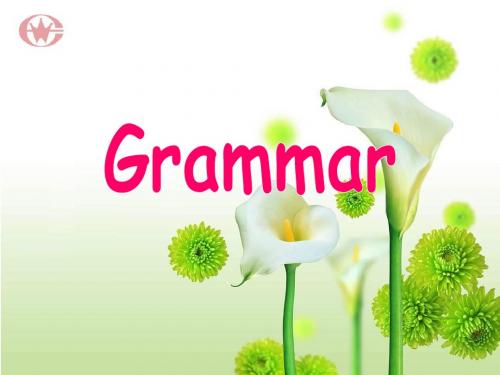
B. make, get, have, help, leave 等表示“致 使”意义的动词 What made them so frightened? C. like, want, wish, order 等表示“希望、 要求”等意义的动词 He won’t like such questions discussed at the meeting. 他不想让这样的问题在会上讨论。
完成句子。 1. _______ Polluted (污染的)air and water are harmful to people’s health. 2. The problem discussed ____________________ at the meeting (在会议上讨论的) yesterday was very difficult to solve.
⑵ 现在分词与过去分词的区别: ① 定语中 现在分词作定语常表示“动作正在 进行”,此时或当时的状态等;过去分词 则常表示“动作发生在谓语动词的动作 前”等;被修饰的名词一般是现在分词 的逻辑主语,是过去分词的逻辑宾语。
如: I know the man standing there.
我认识站在那儿的那个人。 Is there anything planned for tonight? 今晚有什么活动吗?
D. having exhausted
12. You can make yourself ___ in
English pretty well if you keep on
speaking the language.
A. understand B. understanding C. to understand D. understood
英语语法体系(English Grammar)
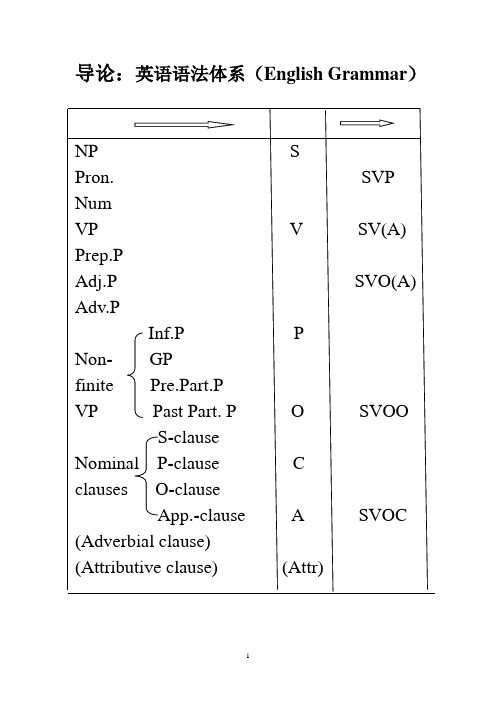
导论:英语语法体系(English Grammar)英语语法课程体系基本概念1.词性 2. 语法层次 3. 词类的功能(常规/非常规)4. 分句成分(常规/非常规)4. 词类与成分对应关系 5. 基本句型英语句子常态结构一、句内关系模块1. 支配关系(动词概述)2. 一致关系二、非限定动词模块3. 动名词4. 动词不定式5. 分词三、从句模块6. 名词性从句7. 状语从句8. 定语从句四、限定动词模块9. 动词的时与体10. 将来时间表示法11. 虚拟语气12. 情态助动词五、名词模块13. 名词及其属格14. 限定词六、修饰语模块15. 形容词16. 副词17. 介词七、英汉对比模块18. 英汉句型比较19. 英汉句子结构比较20. 英汉词汇搭配、词义对比21. 英汉表达法比较22. 英汉连贯与衔接对比英语句子的非常态结构1.(反意疑问句)2. It 句型与There be 句型3.强调句4. 倒装5.分隔(前置与后置)6. 省略7.替代综合练习1.句型判断2. 联句3.语法手段判断4. 长难句结构分析Language possess grammatical systems not, as some learners might be inclined to think, simply to make the learning of the language more difficult, but to express meanings. The grammatical devices of a language are not to be learned as an end in themselves. It is the capacity to express meaning that is the end. The grammatical system provides the necessary means.第一讲语法的内容总论英语的基本结构单位有词和句两个,因而词的构造规则和句的构造规则就成为英语语法的基本内容,分别由词法和句法去研究。
英语语法(Grammar)

英语语法(Grammar)一、一般疑问句(The General Question Sentence)1、句子中有am ,is ,are的,把am ,is ,are提前,句号(period /΄piəriəd/)变成问号(question mark)。
例:This is a boy. →Is this a boy?2、句子中有will ,can的,把will, can提前,句号(period /΄piəriəd/)变成问号(question mark)。
例:He can play ball. →Can he play ball?3、变一般疑问句时,把I we变成you,把am变成are 。
例:I am a boy. →Are you a boy?4、当句子中没有am ,is ,are ,will ,can时,需do , does帮忙⑴当句子人称是I , we, you , they等第一、第二人称或为复数名词(Birds)时,句子前加Do,句号变问号。
例:I know that man. →Do you know that man?⑵当句子人称是she, he, it等第三人称或为单数名词(a chair)时,句子前加Does,动词变成原形(has →have),句号变问号。
例:Lucy runs fast. →Does Lucy run fast?He has apen. →Does he have a pen?二、特殊疑问句(Special Interrogative Sentence)1、特殊疑问词:What(什么),Who(谁)What对thing提问(thing指职业、不明白的事或物), Who对person提问(person指人)。
结构:特殊疑问词+一般疑问句+?例:He is a doctor.用What代替a doctor, is提前到he前→What is he?This is a chair. →What is this?That woman is my mother. →Who is that woman?2、划线部分是地点(place):→用Where提问。
语法单词grammar
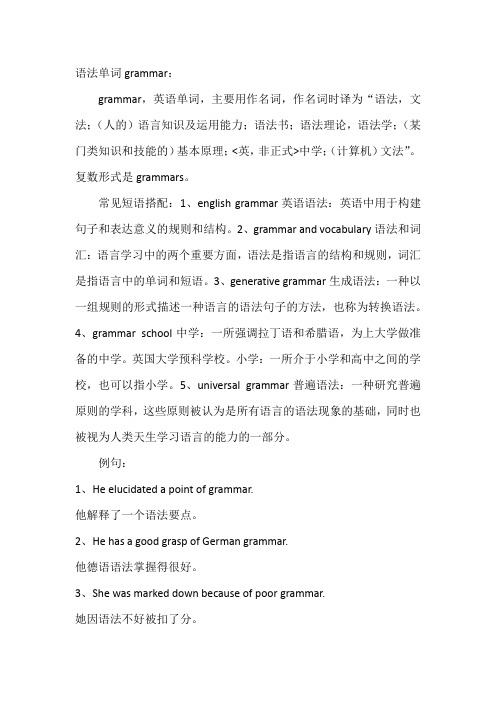
语法单词grammar:
grammar,英语单词,主要用作名词,作名词时译为“语法,文法;(人的)语言知识及运用能力;语法书;语法理论,语法学;(某门类知识和技能的)基本原理;<英,非正式>中学;(计算机)文法”。
复数形式是grammars。
常见短语搭配:1、english grammar英语语法:英语中用于构建句子和表达意义的规则和结构。
2、grammar and vocabulary语法和词汇:语言学习中的两个重要方面,语法是指语言的结构和规则,词汇是指语言中的单词和短语。
3、generative grammar生成语法:一种以一组规则的形式描述一种语言的语法句子的方法,也称为转换语法。
4、grammar school中学:一所强调拉丁语和希腊语,为上大学做准备的中学。
英国大学预科学校。
小学:一所介于小学和高中之间的学校,也可以指小学。
5、universal grammar普遍语法:一种研究普遍原则的学科,这些原则被认为是所有语言的语法现象的基础,同时也被视为人类天生学习语言的能力的一部分。
例句:
1、He elucidated a point of grammar.
他解释了一个语法要点。
2、He has a good grasp of German grammar.
他德语语法掌握得很好。
3、She was marked down because of poor grammar.
她因语法不好被扣了分。
英语语法大全 English Grammar
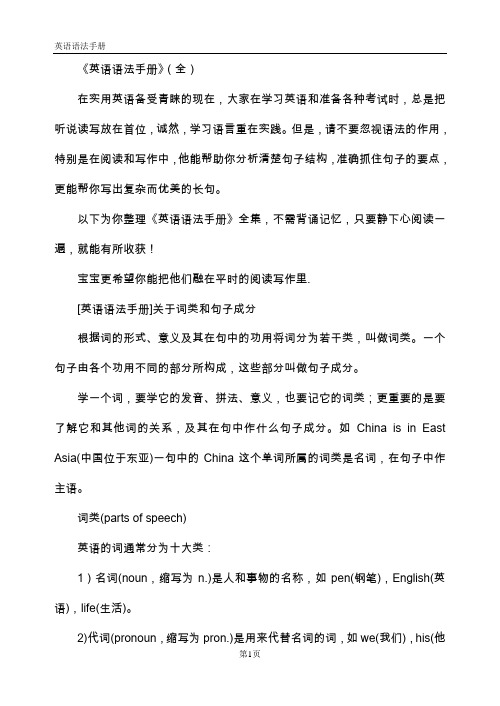
《英语语法手册》(全)在实用英语备受青睐的现在,大家在学习英语和准备各种考试时,总是把听说读写放在首位,诚然,学习语言重在实践。
但是,请不要忽视语法的作用,特别是在阅读和写作中,他能帮助你分析清楚句子结构,准确抓住句子的要点,更能帮你写出复杂而优美的长句。
以下为你整理《英语语法手册》全集,不需背诵记忆,只要静下心阅读一遍,就能有所收获!宝宝更希望你能把他们融在平时的阅读写作里.[英语语法手册]关于词类和句子成分根据词的形式、意义及其在句中的功用将词分为若干类,叫做词类。
一个句子由各个功用不同的部分所构成,这些部分叫做句子成分。
学一个词,要学它的发音、拼法、意义,也要记它的词类;更重要的是要了解它和其他词的关系,及其在句中作什么句子成分。
如China is in East Asia(中国位于东亚)一句中的China这个单词所属的词类是名词,在句子中作主语。
词类(parts of speech)英语的词通常分为十大类:1)名词(noun,缩写为n.)是人和事物的名称,如pen(钢笔),English(英语),life(生活)。
2)代词(pronoun,缩写为pron.)是用来代替名词的词,如we(我们),his(他的),all(全部)。
3)形容词(adjective,缩写为adj.)用来修饰名词,如great(伟大的),honest(诚实的),difficult(困难的)。
4)数词(numeral,缩写为num.)是表示"多少"和"第几"的词,如four(四),eighteen(十八),first(第一),eighth(十八),hundred(一百)。
5)动词(verb,缩写为v)表示动作和状态,如write(写),walk(行走),think(想)。
6)副词(adverb,缩写为。
adv.)是修饰动词、形容词和副词的词,如quickly(快),often(经常),very(很)。
英语语法体系(English Grammar)

导论:英语语法体系(English Grammar)英语语法课程体系基本概念1.词性 2. 语法层次 3. 词类的功能(常规/非常规)4. 分句成分(常规/非常规)4. 词类与成分对应关系 5. 基本句型英语句子常态结构一、句内关系模块1. 支配关系(动词概述)2. 一致关系二、非限定动词模块3. 动名词4. 动词不定式5. 分词三、从句模块6. 名词性从句7. 状语从句8. 定语从句四、限定动词模块9. 动词的时与体10. 将来时间表示法11. 虚拟语气12. 情态助动词五、名词模块13. 名词及其属格14. 限定词六、修饰语模块15. 形容词16. 副词17. 介词七、英汉对比模块18. 英汉句型比较19. 英汉句子结构比较20. 英汉词汇搭配、词义对比21. 英汉表达法比较22. 英汉连贯与衔接对比英语句子的非常态结构1.(反意疑问句)2. It 句型与There be 句型3.强调句4. 倒装5.分隔(前置与后置)6. 省略7.替代综合练习1.句型判断2. 联句3.语法手段判断4. 长难句结构分析Language possess grammatical systems not, as some learners might be inclined to think, simply to make the learning of the language more difficult, but to express meanings. The grammatical devices of a language are not to be learned as an end in themselves. It is the capacity to express meaning that is the end. The grammatical system provides the necessary means.第一讲语法的内容总论英语的基本结构单位有词和句两个,因而词的构造规则和句的构造规则就成为英语语法的基本内容,分别由词法和句法去研究。
高二上学期期中英语语法总结要点

高二上学期英语语法总结Grammar focus语法重点1.The simple passive form of the infinitives.不定式被动态的一般形式的内涵及用法。
2.Four functions of the infinitives used as subject,attribute,object and adverbial.用作主语、定语、宾语和状语的不定式的四种功能的用法。
本单元的语法项目是不定式的被动式,具体讲解如下:①当不定式的逻辑主语是不定式所表示动作的承受者时,不定式一般用被动形式。
不定式被动形式在句中可作主语、表语、状语、补语等。
如:To be obeyed was natural to her.她生性让别人听命于她。
(作主语)The problem remained to be solved.这个问题还有待解决。
(作表语)It needs not to be said that they are very happy together.不必说他们在一起非常幸福。
(作宾语)There were plans to be made at once.要立即制定计划。
(作定语)He has returned only to be sent away again.他回来以后又被打发走了。
(作状语)The captain ordered the flag to be hoisted.船长命令升旗。
(作宾语补足语)The book is intended to be read and not to be torn.这书是供人阅读的而不是供人撕毁的。
(作主语补足语)②在某些句子中,不定式虽表被动,但仍用主动形式。
如:What is to pay?要付多少钱?The reason is not far to seek.道理很浅显。
He gave me some books to read.他给了我一些书读。
English Grammar 英语语法

English Grammar英语基本句型祥解倒装句结构及其应用反意疑问句总结定语从句及其练习形容词/副词英语动词学习导航名词性从句状语从句非谓语动词概述虚拟语气英语基本句型更多语法详细讲解有待以后慢慢推出,也可发电子邮件给我与您交流。
欢迎给我留言,欢迎共同合作!英语句子看上去纷繁庞杂,但仔细观察不外乎五个基本句式。
这五个基本句式可以演变出多种复杂的英语句子。
换言之,绝大多数英语句子都是由这五个基本句式生成的。
这五个基本句式如下:S十V主谓结构S十V十F主系表结构S十V十O主谓宾结构S十V十O1十O2 主谓双宾结构S十V十O十C 主谓宾补结构说明:S=主语;V=谓语;P=表语;O=宾语;O1=间接宾语;O2=直接宾语;C=宾语补足语五个基本句式详细解释如下:1.S十V句式在此句式中,V是不及物动词,又叫自动词(vi.)。
例如:He runs quickly.他跑得快。
They listened carefully.他们听得很仔细。
He suffered from cold and hunger.他挨冻受饿。
China belongs to the third world country.中国属于第三世界国家。
The gas has given out.煤气用完了。
My ink has run out.我的钢笔水用完了。
2.S十V十P句式在此句式中,V是系动词(link v.),常见的系动词有:look,seem,appear,sound,feel,taste,smell,grow,get,fall ill/asleep,stand/sit still,become,turn等。
例如:He is older than he looks.他比看上去要老。
He seen interested in the book.他似乎对这本书感兴趣。
The story sounds interesting.这个故事听起来有趣。
英语教学法课件-Unit-7-Teaching-Grammar(下载)
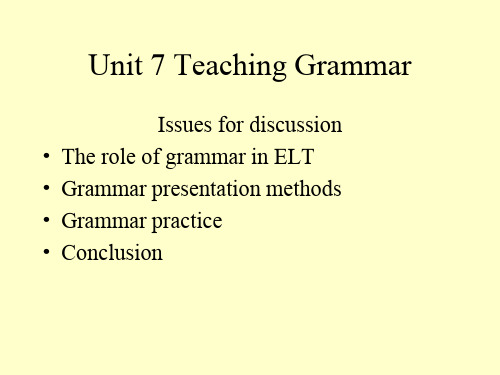
The deductive method (p. 104)
• The deductive method relies on reasonsentation of an example → 2) explanation (comparison may be done
Understanding the grammar point (by discovering and analysing)
Checking (identifying errors) Trying it out (a short production activity)
Useful guidelines for teaching grammar
between the target language and the native language) → 3) Ss’s practice (producing sentences) with given prompts
The deductive method is criticized because: • Grammar is taught in an isolated way; • Little attention is paid to meaning; • The practice is often mechanical.
Listening to comprehend (focusing on messages with target structures imbedded)
Listening to notice (by completing a gapped version of the text to raise awareness)
The role of grammar in ELT
- 1、下载文档前请自行甄别文档内容的完整性,平台不提供额外的编辑、内容补充、找答案等附加服务。
- 2、"仅部分预览"的文档,不可在线预览部分如存在完整性等问题,可反馈申请退款(可完整预览的文档不适用该条件!)。
- 3、如文档侵犯您的权益,请联系客服反馈,我们会尽快为您处理(人工客服工作时间:9:00-18:30)。
GRAMMAR
动词时态复习(一)
(一)一般现在时
a. 表示习惯性的动作,常与always, never, every day, often, sometime等连用。
女口:
The postma n always calls at 7.30.
b. 表示主语的特征、性格或能力。
如:
Elle n is an hon est girl, and you can trust her.
Jack writes good En glish but does not speal well.
c. 表示不受时间限制的客观存在,如客观真理、格言、科学事实等。
如:
Facts speak louder tha n words.
Food easily goes bad in hot weather.
d. 在时间和条件状语从句中代替一般将来时。
如:
Where will you stay whe n you get to San Fra ncisco?
I' pay you double if you finish the work by Friday.
e. 表示按规定、计划、安排发生的动作,常用动词有go, come, arrive, leave, start
等。
如:
The flight for Shan ghai leaves at 8:30 tomorrow morni ng.
(二)现在进行时(构成形式为:am / is / are +动词的-ing形式)
a. 表示说话时正在进行的动作或发生的事。
如:
The childre n are making a sno wma n in the yard now.
b. 表示现阶段正在发生的事,此刻不一定在进行。
常用的时间状语有these days,
this week, at prese nt等。
如:
We are preparing for the coming exam these days.
c. 表示一个按计划即将发生的动作。
所用动词多是转移动词,如arrive, come, go,
leave, retur n 等。
如:
The headmaster is leaving for Beiji ng this weeke nd.
d. 表示经常性的动作。
常与always, forever等连用,表示赞叹、厌烦等情绪。
女口:
兴David is always helping others.
兴Why are you forever asking questi ons?
(三)一般将来时
▲其构成形式之一为:shall (第一人称)/ will (所有人称)+动词原形表示将要发生的事,但这种将来意义常带有说话人的主观态度和看法。
如:
You will feel better after taking this medicine.
This time next week I shall / will be in Scotland.
▲另一种构成形式为:be (am / is / are) goi ng to+动词原形
a. 表示“意图”,即打算将来做某事。
如:
Are you going to post hat letter by airmail?
b. 表示“预见”,即现在已有的迹象表明将要发生某种情况。
如:
Look! Here come the dark clouds. It is going torain.
(四)现在完成时(构成形式为:have / has +动词的-ed形式)
a.表示过去发生的动作对现在有影响,常与already, yet, never, rece ntly, eve等连
用。
如:
They have spent nearly a billion dollars on it already.
b. 表示过去已经开始,持续到现在(可能还会继续下去)的动作或状态。
常与 since,
“for + 一段时间” ,so far, in recent years 等连用。
如:
I have known Jo a n n a since she was born.
c. 在时间和条件状语从句中,表示将来某时已经完成的动作。
如:
Frank will return me the book if he has finished reading it.
【即学即练】
I. 从 A 、 B 、C 、D 四个选项中,选出可以填入空白处的最佳选项
1. Walmart, which is one of the largest American supermarket chains, ____ some of its stores open 24 hours on Mondays through Saturdays. (安徽 2012)
A. keeps
B. keep
C. have kept
D. had kept
2. Food supplies in the flood-stricken area _____ . We must act immediately before there 's none left. (重庆 2012)
B. are running out D. are being run out Granny used to say,“because every step (2012 新 课标全国卷 )
A. has shown
B. is showing
C. shows II. 用括号内动词的正确形式完成下面对话。
A
Eve: I 1. _______ (smell) something burning!
Carl: So 2. _______ (do) I. Probably Ann 3. ________ (iron) upstairs. She usually 4.
_______ (iron) while watching TV, and if she 5. ________ (get) very interested in a program she will forget that she 6. ________________ (press) a hot iron on to her clothes.
Eve: That 'stoo dangerous. 7. _______ she ever ______ (burn) herself?
Carl: Yes. Last month she burnt her fingers.
Eve: That 'stoo bad. I 8. _______ (go) to ask her to switch the TV off now.
B
Jimmy: Hello, David. 1. _______ you _______ (finish) your homework yet? David: No, but maybe the teacher 2. ________ (ask) for it.
Jimmy: No such luck. The teacher always 3. ________ (demand) we hand in our
homework on time.
David: But I had a cold last night. I 4. _______ (have) a fever now.
Jimmy: Then you should explain it to the teacher. He 5. _______ (come) soon. David: Yes, I will. 参考答案
GRAMMAR
【即学即练】
I. 1-3 ABC
II. A 1. smell 2. do 3. is ironing 4. irons 5. gets 6. is pressing 7. Has, burnt 8. will go
B 1. Have; finished 2. won 't ask3. demands 4. have / am having 5. is coming / will A. have run out C. have been run out 3. “Life is like walking in the
snow,
D. showed
come。
